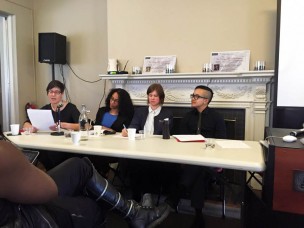The “Queer/Art/Poetics Conference” hosted a three-day conference to explore the question of what art can do, specifically the shapes, sounds, and textures of queer art.
Over the past weekend, the “Queer/Art/Poetics Conference” transformed the Vanguard Lounge in the Center for African American Studies into a space where scholars and students shared and debated ideas about queerness, race, and difference.
Beginning on Thursday, April 23, the three-day conference explored the question of what art can do, specifically focusing on the shapes, sounds, and textures of queer art. Speakers at the conference discussed a variety of topics ranging from critical race theory to disability studies, examined through the lens of pop culture, history, and academia.
The conference was organized by three University faculty members in the Sexual Politics/Sexual Poetics Collective: Visiting Assistant Professor of Theater Katherine Brewer Ball; Assistant Professor of English Rachel Ellis Neyra; and Assistant Professor of English, American Ethnic Studies, and Women’s and Gender Studies at Willamette University Roy Pérez. The recently formed collective is comprised of 11 young queer theory scholars teaching at universities around the country.
The event was co-sponsored by the Center for the Humanities; the Queer Resource Center; the Allbritton Center for the Study of Public Life; the English, American Studies, and Theater Departments; the Feminist, Gender, and Sexuality Studies program; the Office of Equity and Inclusion; and the Alpha Delta Phi Society.
Throughout the three days of the conference, different modes of storytelling—performance, personal, and academic—came together to paint a more cohesive picture of all that queer theory entails. In the context of the conference, “queerness” was understood to mean any kind of societal difference, expanding from its usual connotations of sex and gender.
The first event began with opening remarks by Ball, followed by Pérez, who analyzed the triptych illustration of the conference logo.
Following a speech from Center for the Humanities director Ethan Kleinberg, M. Lamar performed his feature-length work “Surveillance, Punishment & the Black Psyche.” The New York City-based artist bridged the past and present as he created a narrative of African-American history in the United States.
“So much of what we see in terms of the brutalization of the black body isn’t new,” Lamar said. “In some ways, not much has changed.”
Lamar’s piece kicked off when he donned an orange jumpsuit and began to play a piano. Through the piece, he explored multifaceted themes including the legacy of slavery, the policing of black bodies, and an exploration of power dynamics in sex.
His singing was accompanied by cartoon-style visuals projected onto the wall behind him. Using visual and musical cues, he allowed the audience to slow down and contemplate the difficult themes.
“How do you live as a whole person with all of this in you?” Lamar asked during the Q&A following the performance. “It’s not going to go away, so you have to learn to sit with it.”
The conference continued on Friday morning with presentations of papers by members of the collective and University faculty. Each grouping of three to four papers was followed by an interactive Q&A, during which the audience engaged in dialogues about the work presented.
Friday’s sessions were titled “Queer Theory’s Excess Flesh: Accounting for Sex in the Archive,” “Public Privates: Mediations of Queer Intimacy,” and “Fugitive Pleasure: Poetics of Illicit Desire.” They explored varying themes including queer worldmaking, queerness in cinema, and how control and power dynamics operate in society.
The sessions highlighted the idea that art is inherently political and can be used as a tool not only of self-expression, but for critical reexamination and creation of new norms in imagined societies.
Saturday’s sessions continued this dialogue with sessions titled “Body’s Ends: Queer Vitality in the Post-Human” and “Extra-Large Medium: Queer Mattering in Visual Culture.”
The conference closed on Saturday with a talk by Professor of English and Feminist, Gender, and Sexuality Studies Christina Crosby, who recently authored the forthcoming memoir “A Body, Undone: Living on After Great Pain.” In her book and at the event, she chronicled the aftermath of a paralyzing bike accident and how her partner’s love helped her power through.
The talk struck a chord with Kelsey Henry ’15, an American Studies and Feminist, Gender, and Sexuality Studies double major.
“Christina Crosby’s talk was absolutely incredible, and I think it’s so important for academic spaces to be infused with creative nonfiction and work that is emotionally honest,” Henry said. “It moves people, not just politically or intellectually, but emotionally. “
According to the organizers, much of the conference’s power came from the community built over the three days that the conference took place.
“We were thinking about this word cohabitation too when we wrote up the description for the conference,” Ball said. “What does it mean to cohabitate, how do you think about art as a means to…cohabitation, living together? Hearing the papers read aloud was a real experience of sonic cohabitation.”
The conference showed the solidarity of people coming together to examine and celebrate difference in both academic and personal ways.
“I think we’re all pretty world-weary,” Neyra said. “There’s a lot of brutal, terrible shit happening in the world to people who identify in different ways, who signify precarious identifications. But it’s been touching, even amidst debates and disagreements, there’s still that sense of cohabitation.”
-
riotact666
